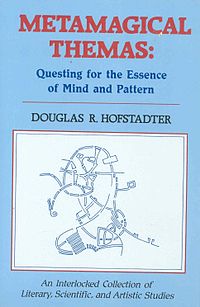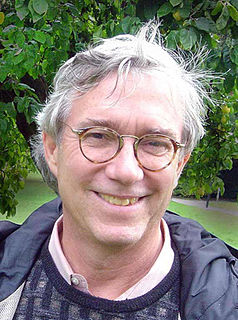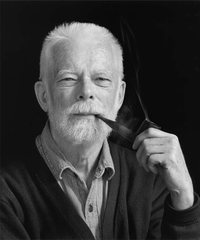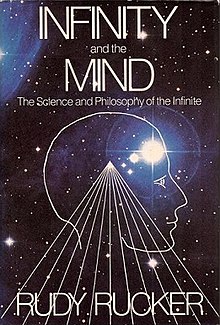The Absolute Infinite is an extension of the idea of infinity proposed by mathematician Georg Cantor.

Georg Ferdinand Ludwig Philipp Cantor was a German mathematician. He created set theory, which has become a fundamental theory in mathematics. Cantor established the importance of one-to-one correspondence between the members of two sets, defined infinite and well-ordered sets, and proved that the real numbers are more numerous than the natural numbers. In fact, Cantor's method of proof of this theorem implies the existence of an infinity of infinities. He defined the cardinal and ordinal numbers and their arithmetic. Cantor's work is of great philosophical interest, a fact he was well aware of.
In the philosophy of mathematics, intuitionism, or neointuitionism, is an approach where mathematics is considered to be purely the result of the constructive mental activity of humans rather than the discovery of fundamental principles claimed to exist in an objective reality. That is, logic and mathematics are not considered analytic activities wherein deep properties of objective reality are revealed and applied, but are instead considered the application of internally consistent methods used to realize more complex mental constructs, regardless of their possible independent existence in an objective reality.
The philosophy of mathematics is the branch of philosophy that studies the assumptions, foundations, and implications of mathematics. It aims to understand the nature and methods of mathematics, and find out the place of mathematics in people's lives. The logical and structural nature of mathematics itself makes this study both broad and unique among its philosophical counterparts.
Gödel's incompleteness theorems are two theorems of mathematical logic that are concerned with the limits of provability in formal axiomatic theories. These results, published by Kurt Gödel in 1931, are important both in mathematical logic and in the philosophy of mathematics. The theorems are widely, but not universally, interpreted as showing that Hilbert's program to find a complete and consistent set of axioms for all mathematics is impossible.

Metamagical Themas is an eclectic collection of articles that Douglas Hofstadter wrote for the popular science magazine Scientific American during the early 1980s. The anthology was published in 1985 by Basic Books.

Rudolf von Bitter Rucker is an American mathematician, computer scientist, science fiction author, and one of the founders of the cyberpunk literary movement. The author of both fiction and non-fiction, he is best known for the novels in the Ware Tetralogy, the first two of which both won Philip K. Dick Awards. Until its closure in 2014 he edited the science fiction webzine Flurb.

Edward Nelson was an American mathematician. He was professor in the Mathematics Department at Princeton University. He was known for his work on mathematical physics and mathematical logic. In mathematical logic, he was noted especially for his internal set theory, and views on ultrafinitism and the consistency of arithmetic. In philosophy of mathematics he advocated the view of formalism rather than platonism or intuitionism. He also wrote on the relationship between religion and mathematics.

White Light is a work of science fiction by Rudy Rucker published in 1980 by Virgin Books in the UK and Ace books in the US. It was written while Rucker was teaching mathematics at the University of Heidelberg from 1978 to 1980, at roughly the same time he was working on the non-fiction book Infinity and the Mind.
David Berlinski is an American author who has written books about mathematics and the history of science as well as fiction. An opponent of evolution, he is a senior fellow of the Discovery Institute's Center for Science and Culture, an organization dedicated to promulgating the pseudoscience of intelligent design.
The infinity symbol is a mathematical symbol representing the concept of infinity. This symbol is also called a lemniscate, after the lemniscate curves of a similar shape studied in algebraic geometry, or "lazy eight", in the terminology of livestock branding.

Ivor Owen Grattan-Guinness was a historian of mathematics and logic.
Popular mathematics is mathematical presentation aimed at a general audience. Sometimes this is in the form of books which require no mathematical background and in other cases it is in the form of expository articles written by professional mathematicians to reach out to others working in different areas.

Originally, fallibilism is the philosophical principle that propositions concerning empirical knowledge can be accepted even though they cannot be proven with certainty, or in short, that no beliefs are certain. The term was coined in the late nineteenth century by the American philosopher Charles Sanders Peirce, as a response to foundationalism. Nowadays, theorists may also refer to fallibilism as the notion that empirical knowledge might turn out to be false. Fallibilism is often juxtaposed with infallibilism.

In philosophy and theology, infinity is explored in articles under headings such as the Absolute, God, and Zeno's paradoxes.

Infinity is that which is boundless, endless, or larger than any natural number. It is often denoted by the infinity symbol .
Logical Intuition, or mathematical intuition or rational intuition, is a series of instinctive foresight, know-how, and savviness often associated with the ability to perceive logical or mathematical truth—and the ability to solve mathematical challenges efficiently. Humans apply logical intuition in proving mathematical theorems, validating logical arguments, developing algorithms and heuristics, and in related contexts where mathematical challenges are involved. The ability to recognize logical or mathematical truth and identify viable methods may vary from person to person, and may even be a result of knowledge and experience, which are subject to cultivation. The ability may not be realizable in a computer program by means other than genetic programming or evolutionary programming.
In logic, an infinite-valued logic is a many-valued logic in which truth values comprise a continuous range. Traditionally, in Aristotle's logic, logic other than bivalent logic was abnormal, as the law of the excluded middle precluded more than two possible values for any proposition. Modern three-valued logic allows for an additional possible truth value and is an example of finite-valued logic in which truth values are discrete, rather than continuous. Infinite-valued logic comprises continuous fuzzy logic, though fuzzy logic in some of its forms can further encompass finite-valued logic. For example, finite-valued logic can be applied in Boolean-valued modeling, description logics, and defuzzification of fuzzy logic.

Mathenauts: Tales of Mathematical Wonder is a 1987 anthology edited by Rudy Rucker and published by Arbor House.
The Princeton Science Library is a book series of popular science written by scientists known for their popular writings and originally published by Princeton University Press.










